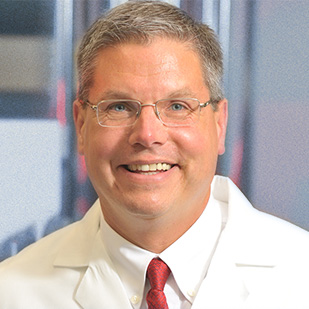Chief's Message

SQLIFTS seeks to use enabling technologies to link fundamental discovery-based laboratory research programs with our high-volume clinical programs in the CTI to accelerate both discovery and clinical research.”
Scott Budinger, MD
Chief, Division of Pulmonary and Critical Care
Ernest S. Bazley Professor of Airway Diseases
The Division of Pulmonary and Critical Care Medicine seeks to advance knowledge of lung disease and critical illness and improve patient outcomes through cutting-edge research, innovative education, and premier clinical programs.
Our multidisciplinary research programs are housed in the Simpson Querrey Lung Institute for Translational Sciences (SQLIFTS). Supported by a generous gift from Northwestern University Trustees Lou Simpson and Kimberly Querrey, SQLIFTS seeks to use enabling technologies to link fundamental discovery-based laboratory research programs with our high-volume clinical programs in the Canning Thoracic Institute (CTI) at Northwestern Medicine to accelerate both discovery and clinical research.
SQLIFTs is home to faculty across Northwestern University who seek to participate in lung disease research. SQLIFTs supports the application of innovative technologies to learn about disease from our patients and from patient samples collected as part of disease and use this information to inform causal experiments led by exceptional investigators in our state-of-the-art discovery-based laboratories. The bedside to bench to bedside approach is used by our faculty’s active research programs in basic lung biology and translational/clinical research. Questions they address include: How does a person’s immune system interact with viruses and bacteria during failed or successful treatment of pneumonia? Why do older patients fail to recover from pneumonia? How does the lung repair itself after a severe pneumonia and how does that process fail to cause fibrosis? How do changes in cellular metabolism contribute to age related pathology in the lung? Why are lung transplant outcomes worse than those from other solid organ transplants? What are the early life events that predict the development of chronic lung disease later in life? How do health care disparities affect lung health and what are measures that can address them?
Clinical care in the Division is provided through the Canning Thoracic Institute (CTI). Supported by a generous gift from John Canning, Chair of the NMHC Board, and his wife Rita, the CTI seeks to provide world class care for patients with lung disease across the 11 hospital Northwestern Medicine Health System. As importantly, we are committed to developing innovative clinical programs, closely linked with research to develop new treatments and improve care for patients with lung disease worldwide.
The CTI is home to premier clinical programs covering the range of subspecialty pulmonary and critical care medicine. This includes subspecialty programs in chronic obstructive pulmonary disease, interstitial lung diseases, with a focus in connective tissue related ILD and sarcoidosis, cystic fibrosis, sleep medicine, and non-invasive ventilation. In partnership with the Lurie Cancer Center, the CTI houses an integrated multidisciplinary program to detect and treat patients with chest malignancies that includes specialists in interventional pulmonology, radiology, oncology, radiation oncology and thoracic surgery. Our pulmonary hypertension program is a collaborative program between the CTI and the Bluhm Cardiovascular Institute, where we have developed an integrative program focused on chronic thromboembolic disease that is among the largest in the country. Our lung transplant program is recognized internationally for its innovation and, despite its short history, has become one of the highest volume, highest quality programs in the nation. Our clinical programs are multidisciplinary endeavors involving collaboration with colleagues in allergy-immunology, anesthesiology, cardiology, hematology/oncology, otolaryngology, neurology, palliative medicine, pathology, pediatrics, radiology, rheumatology, thoracic surgery, and many others.
Our clinical and research programs extend to the Jesse Brown VA Medical Center, where we provide care for Veterans in the ICU, hospital and in our general pulmonary and specialty clinics (sleep, pulmonary hypertension). Our faculty are actively engaged in VA funded research and our lung transplant program serves veterans in the Chicago area.
Our educational mission is to support clinical and research training for the next generation of leaders in our field. The Kimberly Querrey Summer Research Program trains high school and college age students for a career in medicine and STEM. The David Cugell Fellowship Program supports trainees from international partners to train in our state-of-the-art labs. Our Pulmonary and Critical Care Medicine Fellowship Program provides outstanding, broad-based clinical training and an intensive research experience. With support from our National Institutes of Health Lung Sciences T32 Training Program and Northwestern University, we provide world-class research training for postdoctoral MD and PhD scientists intending to pursue careers in basic or clinical investigation and PhD students in the Driskill Graduate Program. As evidenced by their success, we are firmly committed to providing the mentorship and support for our clinical and research trainees to achieve the highest level of success in their future careers.
Thank you for your interest in our division. I invite you visit us online or in person. You may contact us for more information.